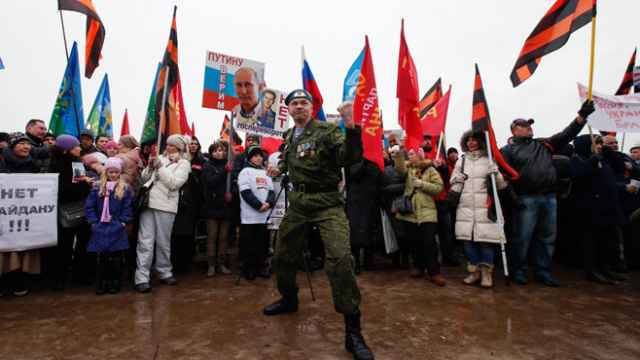An artist who worked for a prominent Russian university said she was forced to resign after a student and faculty protest against a talk by a representative from the the pro-Kremlin Anti-Maidan movement promoting nationalistic, anti-Western views.
Yelizaveta Savolainen, an artist who worked for the Russian State Humanities University, RGGU, in Moscow as a part-time "metodist" — a job that combines the duties of an adviser and an administrative assistant at a Russian university — said she was singled out as a "fall guy" for the jeers and denunciations that students and instructors directed at Anti-Maidan's Nikolai Starikov during his nationalistic talk last month, RFE/RL's Russian service reported Thursday.
Some of the students who took part in the protest received reprimands from the university, Savolainen was quoted as saying. At least one of the professors —dean of the history and theory of culture department, Konstantin Ierusalimsky, who disputed Starikov's claims during the lecture — had his tenure status reviewed, Savolainen said, though it was not immediately clear whether the procedure was related to his remarks.
Savolainen said she did not know many of the students who tried to disrupt Starikov's lecture, RFE/RL reported. But she appeared to take the fall because of a hand-made poster she brought to the university during the talk to indicate that the activists were not welcome.
The poster showed a drawing of quilted jacked, circled and crossed out —symbolism that plays on a Russian slang term "vatnik." Traditionally, a "vatnik" was a quilted jacket with cotton insulation worn by soldiers in the Soviet and Russian armies, but during the Ukraine crisis the word has emerged as a derogatory term for staunch Kremlin supporters.
Savolainen conceded that her poster — which received substantial publicity on social networks — was a "mistake," RFE/RL reported. "Outside the walls of RGGU I can do whatever I want, even stand on my head," she was quoted as saying. "But inside RGGU, I shouldn't have done it, and I apologized for it, for the fact that my artistic action found its way into the university."
Even though she is no longer on the payroll, Savolainen said she would continue as a part-time volunteer at the university, her alma mater, according to the report.
Ierusalimsky, the professor who spoke out during the lecture, said the declared topic of Starikov's talk had been the "fate of Russia," but the presentation began with a short film belittling pro-democracy protests in Ukraine, Egypt and other parts of the world, RFE/RL reported last month
The move prompted students in the audience to shout: "Get out of here! We didn't invite you," the report said.
The Kremlin supports the Anti-Maidan movement, whose name spells out its main purpose: to prevent street rallies, similar to Ukraine's Maidan, which brought down the administration of pro-Russian President Viktor Yanukovich in February 2014.
The group has recently been dispatching speakers to Russian universities to lecture students on its anti-Western, pro-Kremlin agenda. At least two of the movement's leaders — the head of the Night Wolves biker group Alexander Zaldostanov, who goes by the nickname The Surgeon; and a leader of Ukrainian separatists, Oleg Tsaryov — have also given talks, RFE/RL reported.
Starikov's lecture at RGGU drew several dozen listeners, but many left the room as his talk dragged on, according to Twitter accounts by an instructor, Tatyana Volkova.
"Fortunately, we have students and instructors who were outraged by political propaganda within the university's walls," she said in one of the messages.
RGGU is the only Russian university so far whose students and employees have objected to the Anti-Maidan lectures. RFE/RL reported.
A Message from The Moscow Times:
Dear readers,
We are facing unprecedented challenges. Russia's Prosecutor General's Office has designated The Moscow Times as an "undesirable" organization, criminalizing our work and putting our staff at risk of prosecution. This follows our earlier unjust labeling as a "foreign agent."
These actions are direct attempts to silence independent journalism in Russia. The authorities claim our work "discredits the decisions of the Russian leadership." We see things differently: we strive to provide accurate, unbiased reporting on Russia.
We, the journalists of The Moscow Times, refuse to be silenced. But to continue our work, we need your help.
Your support, no matter how small, makes a world of difference. If you can, please support us monthly starting from just $2. It's quick to set up, and every contribution makes a significant impact.
By supporting The Moscow Times, you're defending open, independent journalism in the face of repression. Thank you for standing with us.
Remind me later.





